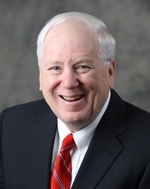Search
02/16/2012
 |
| Amb. Kenneth M. Quinn |
When I welcome Chinese Vice President Xi Jinping to the World Food Prize Hall of Laureates today, it will represent both the culmination of my personal connection to that country over the past five decades, as well as a capstone marking the transformation of China during that period.
My first visit to China came in late 1979, when I accompanied Iowa Gov. Robert Ray on one of the first post-normalization of relations exchange visits arranged by the U.S.-based National Council for U.S.-China Relations. With Governor Ray, I had the opportunity to meet with senior leader Deng Xiaoping as he was leading China out of the tumultuous Cultural Revolution. I then traveled on my own around the country, including to Shanghai and then Guangdong Province, where Vice President Xi’s father, Xi Zhongxun, was serving as governor.
China, in those days, still appeared stark and bland: Everyone was dressed in green or black clothing; there were no new buildings; very few cars were seen, as most people traveled by bicycle; and it was difficult to find shops or restaurants except for a few very basic ones.
However, when I arrived in Guangzhou, the capital of Guangdong, I was stunned to come upon a microscopic harbinger of what was to come in all of China. Inside the old, rather rundown central hotel was an ultramodern coffee shop catering to business representatives who were traveling from Hong Kong. With neon lights, formica tables, Danish modern plastic chairs, waitresses in short dresses, and a menu with Western food, it seemed as out-of-place in China as what the astronauts confronted when they landed on the moon.
What I found of particular interest was the fascination that this restaurant had for the local Chinese staff, who I observed were often standing there just staring at the flashing lights and ringing bells as Western businessmen put Hong Kong dollars into some of the slot machines that had been installed.
Looking back, it seems clear to me that this one small element of modernity probably represented that initial seed from which grew the stunning transformation of China into the modern society that it has become in the 21st century, and over which Xi Jinping will preside if, as is expected, he becomes China’s president later this year.
From that small spark, the economic, social and technical transformation of modern China has erupted and now covers the entire country. Arguably, the past decades may come to represent the most dramatic period of economic growth ever to occur in China’s history. That it began in the province where Vice President Xi’s father, Xi Zhongxun, served as governor is of great significance to Iowa history.
For in 1980, to reciprocate the visit of Governor Ray, a delegation of Chinese provincial leaders traveled to this state, led by the same Gov. Xi Zhongxun. I had the great honor of being with Governor Ray at the Des Moines airport to greet the delegation and to welcome Governor Xi. Five years later, Gov. Terry Branstad had the opportunity to received a delegation from Hebei Province, Iowa’s sister state, which included Governor Xi’s son, Xi Jinping, who was then a provincial official.
At Governor Branstad’s invitation, now Vice President Xi Jinping is returning to Iowa; and at Agriculture Secretary Tom Vilsack’s invitation, the vice president is coming to the World Food Prize Hall of Laureates. When Vice President Xi arrives at the World Food Prize Hall of Laureates this morning, it will represent my personal Chinese odyssey and Iowa’s Chinese connection coming full circle.
I have thought about how to mark this special moment. It came to me as I stood in our Iowa Gallery at the Hall of Laureates, where there are displayed paintings of many events which make up Iowa’s agricultural and humanitarian heritage. Included are works by Iowa artists depicting the visits of Soviet Premier Khrushchev and Pope John Paul II. I want Vice President Xi to know that the World Food Prize will commission a painting of his historic visits to our state to hang in this special room, so that this unique relationship that he and his father have to Iowa will always be remembered as an equally important part of our history.
-- From the Des Moines Register, Feb. 16, 2012.
Read Amb. Kenneth M. Quinn's full biography here


